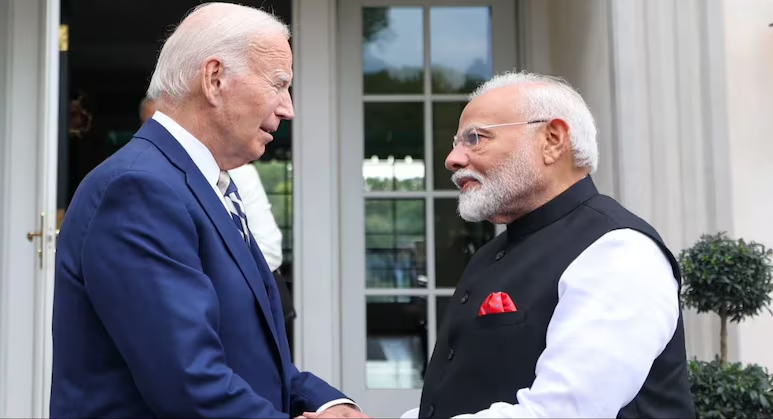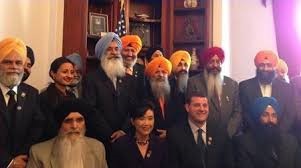
- The Quad summit and Modi’s visit to the US come at a time when Indo-US relations are poised on a knife-edge. The United States’ growing acknowledgement of Khalistani groups raises significant concerns.
- With figures like Pannun at the helm and the tacit support of countries like the US and Canada, India will need to remain vigilant, ensuring that its foreign policy addresses both the internal and external dimensions of this longstanding challenge.
- As India navigates these choppy diplomatic waters, one thing remains clear: The Khalistan movement, though largely marginalized within India, continues to find fertile ground abroad.
The intricate dynamics of international diplomacy often reveal both delicate alliances and unsettling tensions. The adage “It is dangerous to have America as an enemy, but it is lethal to have it as a friend” has never seemed more relevant than in the context of recent events surrounding the Indo-US relationship. As Indian Prime Minister Narendra Modi embarks on his visit to the United States for the Quad summit, a peculiar development involving key Indian figures—National Security Advisor (NSA) Ajit Doval and former Research and Analysis Wing (RAW) Chief Samant Goel—has raised eyebrows. A New York district court has summoned these officials in connection with an alleged assassination attempt on Khalistani sympathizer Gurpatwant Singh Pannun, further complicating the already fraught Indo-US dynamic.
The allegations revolve around the Indian government’s purported involvement in an assassination plot targeting Pannun, a vocal advocate for the separatist Khalistan movement, which seeks to create an independent Sikh state. Pannun, who has dual citizenship in the United States and Canada, is no stranger to controversy. Designated a terrorist by India and accused of orchestrating several terror incidents in the country, Pannun heads the Sikhs for Justice (SFJ), a pro-Khalistan organization banned in India for its subversive activities.
While the court’s summons has caused some alarm, a former senior Indian diplomat, who has served in the US, has downplayed its significance. He clarified that the summons is not an arrest warrant, and any court summons involving foreign nationals must be routed through the US State Department before reaching the Indian Embassy and the Ministry of External Affairs (MEA) in Delhi. Given the diplomatic immunity enjoyed by Doval and Goel while in the US, the likelihood of any immediate action is slim. The diplomat cited a 2013 incident involving then-Prime Minister Manmohan Singh, who was similarly summoned by a US court following a motion filed by Sikhs for Justice. Singh’s diplomatic immunity protected him from any legal repercussions, and the same is expected for the current case.
Foreign Secretary Vikram Misri has outrightly dismissed the court summons, calling the accusations “unwarranted and unsubstantiated.” He pointed out the dubious nature of the source behind the case—Pannun himself, whose anti-India stance is well-known. Pannun, notorious for his inflammatory rhetoric, once openly threatened to harm Prime Minister Modi during his 2023 visit to Assam, further cementing his status as a dangerous figure in the eyes of Indian authorities.
This recent development has emerged at a critical juncture, coinciding with Prime Minister Modi’s scheduled meetings in the US, including the Quad summit and his address at the United Nations General Assembly. The timing suggests that Pannun may be attempting to use the court case to stoke anti-India sentiment in the US and garner sympathy for his cause. Despite this, Modi’s decision to proceed with the visit indicates that the Indian government is not unduly concerned by the legal manoeuvrings of a separatist leader.
Interestingly, just a day before Modi’s arrival, the White House hosted a meeting with a delegation of American Sikhs, including members of pro-Khalistan organizations like the Sikh Coalition and the American Sikh Caucus Committee. The meeting, initiated by the US National Security Council, was the first time the White House had officially engaged with such groups. The officials reportedly assured the Sikh delegation of the US government’s commitment to protecting them from any “transnational repression,” a term that has become increasingly prominent in recent discussions about diaspora communities facing external pressures from their countries of origin.
The timing suggests that Pannun may be attempting to use the court case to stoke anti-India sentiment in the US and garner sympathy for his cause.
This development adds a new layer of complexity to the Indo-US relationship, particularly concerning the issue of Khalistani separatism. While the US has refrained from officially commenting on allegations of harbouring separatist elements, Canada, where Khalistani activists have also found refuge, has defended their presence under the guise of “freedom of speech.” This stance did not sit well with India. External Affairs Minister S. Jaishankar recently made a pointed remark on the matter, stating that while India respects freedom of speech, it does not equate to freedom to support separatism or violence.
The United States’ growing acknowledgement of Khalistani groups, however, raises significant concerns. These organizations, while banned in India, have found a degree of legitimacy in the US and Canada, where they continue to propagate their agenda. The American Sikh Caucus Committee, for instance, has been particularly active in recent years, advocating for the creation of an independent Khalistan. The group’s founder, Pritpal Singh, has even been spotted engaging with Pakistani leaders, raising suspicions about the broader geopolitical motivations behind the movement. Singh’s social media posts from 2019, which feature him alongside key Pakistani figures, hint at an established nexus between the Khalistan movement and external actors seeking to destabilize India.
Foreign Secretary Vikram Misri has outrightly dismissed the court summons, calling the accusations 'unwarranted and unsubstantiated.
The American Sikh Caucus Committee appears to be an active secessionist organisation that propagates the demand for Khalistan and has been active since at least 2015. One of its main members, Pritpal Singh, has been seen frequently engaging with Pakistani leaders, as evidenced by his Facebook posts.
In February 2020, he shared a photograph of himself sitting next to Naemul Haq, a PTI veteran leader who passed away that month. The photograph was from 2019. In his post, Pritpal wrote, “On the passing of Naemul Haq, Pakistan has lost a great leader and Sikhs a dear friend.”

In another post from 2019, he shared a post by journalist Azmi Gill where the Governor of Punjab (Pakistan), Ch Mohammad Sarwar, met the Pakistani community in the Bay Area, San Francisco, California. Pritpal Singh was present at that meeting, raising serious concerns about his circle of “friends” and associates. In the images below, Pritpal Singh of the American Sikh Caucus Committee could be spotted with Avtar Singh Pannun, President of Sikhs for Justice, establishing a direct connection with the secessionist group.
Adding to the tension, US Congressman Adam Schiff recently introduced the ‘Transnational Repression Reporting Act 2024,’ which mandates federal agencies to report instances of transnational repression against individuals on US soil. While the bill is ostensibly aimed at protecting American citizens, it could potentially create a diplomatic rift between the US and countries like India, whose governments may be accused of exerting influence over their diaspora communities.
The Quad summit and Modi’s visit to the US come at a time when Indo-US relations are poised on a knife-edge. While the two nations continue to collaborate on strategic fronts, particularly in the Indo-Pacific region, domestic and international political developments, such as the Khalistan issue, threaten to disrupt this partnership. Pannun’s provocations, and the US government’s response to them, will likely play a crucial role in shaping the future trajectory of Indo-US ties.
As India navigates these choppy diplomatic waters, one thing remains clear: The Khalistan movement, though largely marginalized within India, continues to find fertile ground abroad. With figures like Pannun at the helm and the tacit support of countries like the US and Canada, India will need to remain vigilant, ensuring that its foreign policy addresses both the internal and external dimensions of this longstanding challenge. How India manages to balance its diplomatic engagements while addressing the growing concerns of transnational separatism will ultimately determine the success of its international outreach.
(Diksha Bharti is currently pursuing a Master’s program in Russian studies. She has previously worked as a Research Associate at Politika and the Consilium Research Institute. She has a keen interest in geopolitics and has contributed to several reputed platforms. Views expressed are the author’s own.)
Diksha Bharti is currently pursuing a Master’s program in Russian studies. She has previously worked as a Research Associate at Politika and the Consilium Research Institute. She has a keen interest in geopolitics and has contributed to several reputed platforms. Views expressed are the author’s own.
